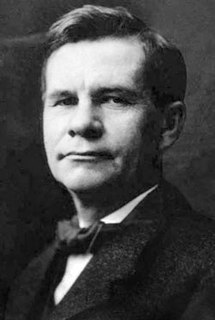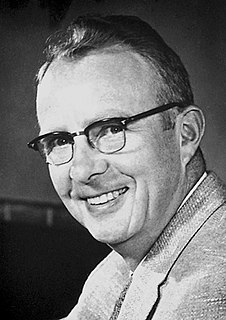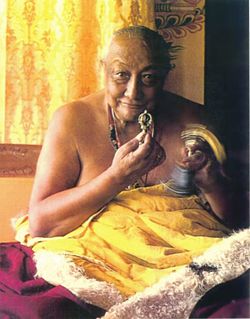Top 411 Intrinsic Quotes & Sayings - Page 7
Explore popular Intrinsic quotes.
Last updated on April 19, 2025.
Wrath, unlike love, is not one of the intrinsic perfections of God. Rather, it is a function of God's holiness against sin. Where there is no sin, there is no wrath-but there will always be love in God. Where God in His holiness confronts His image-bearers in their rebellion, there must be wrath, or God is not the jealous God He claims to be, and His holiness is impugned. The price of diluting God's wrath is diminishing God's holiness.
From the standpoint of education, genius means essentially 'giving birth to the joy in learning.' I'd like to suggest that this is the central task of all educators. It is the genius of the student that is the driving force behind all learning. Before educators take on any of the other important issues in learning, they must first have a thorough understanding of what lies at the core of each student's intrinsic motivation to learn, and that motivation originates in each student's genius.
I argue for a relational conception of the person as a basis for an environmental ethic that can encourage us to preserve the environment not solely on the basis of satisfying human interests and not solely because we might attribute intrinsic value to the environment, but because the environment is something with which we can potentially enter into constructive relationship, as part of what makes us who we are or transform who we are and open us up to new interests.
To put it simply, we need to keep the arts in education because they instill in students the habits of mind that last a lifetime: critical analysis skills, the ability to deal with ambiguity and to solve problems, perseverance and a drive for excellence. Moreover, the creative skills children develop through the arts carry them toward new ideas, new experiences, and new challenges, not to mention personal satisfaction. This is the intrinsic value of the arts, and it cannot be overestimated.
The great gift of a spiritual path is coming to trust that you can find a way to true refuge. You realize that you can start right where you are, in the midst of your life, and find peace in any circumstance. Even at those moments when the ground shakes terribly beneath you—when there’s a loss that will alter your life forever—you can still trust that you will find your way home. This is possible because you’ve touched the timeless love and awareness that are intrinsic to who you are.
When someone tells you, 'I love you,' and then you feel, 'Oh, I must be worthy after all,' that's an illusion. That's not true. Or someone says, 'I hate you,' and you think, 'Oh, God, I knew it; I'm not very worthy,' that's not true either. Neither one of these thoughts hold any intrinsic reality. They are an overlay. When someone says, 'I love you,' he is telling you about himself, not you. When someone says, 'I hate you,' she is telling you about herself, not you. World views are self views-literally.
Gradually, ... the aspect of science as knowledge is being thrust into the background by the aspect of science as the power of manipulating nature. It is because science gives us the power of manipulating nature that it has more social importance than art. Science as the pursuit of truth is the equal, but not the superior, of art. Science as a technique, though it may have little intrinsic value, has a practical importance to which art cannot aspire.
To me, then, true criticism consists in trying to find out the intrinsic worth of the thing itself, and not in attributing a quality to that thing. You attribute a quality to an environment, to an experience, only when you want to derive something from it, when you want to gain or to have power or happiness. Now this destroys true criticism. Your desire is perverted through attributing values, and therefore you cannot see clearly. Instead of trying to see the flower in its original and entire beauty, you look at it through coloured glasses, and therefore you can never see it as it is.
And whatever the form of your own resurrection, you will arise, driven not by the Great Search, but by your own Great Duty, your limitless Dharma, the manifestation of your own highest potentials, and the world will begin to change because of you. And you will never flinch, and you will never fail in that great Duty, and you will never turn away, because simple, ever-present awareness will be with you now and forever, even unto the end of the worlds, because now and forever and endlessly forever, there is only Spirit, only intrinsic awareness of just this, and nothing more.
You simply pour, it will come. And if it is not coming, nothing to be worried about - because a lover knows that to love is to be happy. If it comes, good; then the happiness is multiplied. But even if it never comes back, in the very act of loving you become so happy, so ecstatic, who bothers whether it comes or not? Love has its own intrinsic happiness. It happens when you love. There is no need to wait for the result. Just start loving. By and by you will see much more love is coming back to you. One loves and comes to know what love is only by loving.
The holiness of the kingdom of God must be preserved. If Jesus refused to acknowledge and fight for Israel as God's favored nation- even though it was the one nation in history that actually held this status at one time- how much more must his followers refuse to acknowledge and fight for America as God's favored nation" To say it another way, if Jesus was committed solely to establishing a kingdom that had no intrinsic nationalistic or ethnic allegiances- not even with Israel- how much more should his followers be committed to expanding this unique, non-nationalistic kingdom?
We know that global capitalism, and the commercially driven culture that comes with it, can be a powerful solvent, but many of us who benefit from it economically can regret the effect it has on our own lives as well as on the lives of others, and we should not view ourselves as helpless in the face of an irresistible force, especially since we may very well be complicit. We should be prepared to help others or to leave them be to sustain their cultures if we judge that they are of intrinsic value or of value to their members.
I don't think I have rebelled against Latina culture. I have rebelled against those who try to make me warm tortillas for my brothers when they can warm them for themselves, I have rebelled against a patriarchal religion. I rebel against small mindedness in all ways and in every situation but those things are not an intrinsic part of Latina culture and I will fight tooth and nail against anyone who tries to make me feel like I'm less Xicana for not embracing the small-mindedness.
Remember one very fundamental thing about life: Any experience that has not been lived will hang around you, will persist: "Finish me! Live me! Complete me!" There is an intrinsic quality in every experience that it tends and wants to be finished, completed. Once completed, it evaporates; incomplete, it persists, it tortures you, it haunts you, it attracts your attention. It says, "What are you going to do about me? I am still incomplete - fulfill me!"
I don't think there's any intrinsic difference between a lover and a husband. ... If I were cynical, I would say that a woman should have both a good husband and a lover. But I'm not cynical so I'll just say that a woman should have a lover who's a good husband and a husband who's a good lover, perhaps both.
Economists and workplace consultants regard it as almost unquestioned dogma that people are motivated by rewards, so they don't feel the need to test this. It has the status more of religious truth than scientific hypothesis. The facts are absolutely clear. There is no question that in virtually all circumstances in which people are doing things in order to get rewards, extrinsic tangible rewards undermine intrinsic motivation.The bonus myth: How paying for results can backfire The world is a dangerous place, not because of those who do evil, but because of those who look on and do nothing.
So this Zealot comes to my door, all glazed eyes and clean reproductive organs, asking me if I ever think about God. So I tell him I killed God. I tracked God down like a rabid dog, hacked off his legs with a hedge trimmer, raped him with a corncob, and boiled off his corpse in an acid bath. So he pulls an alternating-current taser on me and tells me that only the Official Serbian Church of Tesla can save my polyphase intrinsic electric field, known to non-engineers as "the soul." So I hit him. What would you do?
Everything has to be intrinsic plot-wise in the same way, to use the Linda Williams analogy but to move it on a bit, as musicals - in old musicals, like in an old Cole Porter musical, you get the action, then they do a song, which reflects a moment - everything stops while that is being sung - and then you restart. These days in most musicals, the plot keeps moving through the song. I think it would be nice if someone constructed some pornography where the sex continues to propel you through the story.
It has become, in my view, a bit too trendy to regard the acceptance of death as something tantamount to intrinsic dignity. Of course I agree with the preacher of Ecclesiastes that there is a time to love and a time to die - and when my skein runs out I hope to face the end calmly and in my own way. For most situations, however, I prefer the more martial view that death is the ultimate enemy - and I find nothing reproachable in those who rage mightily against the dying of the light.
I think, while it is true that the Hillary Clinton and I voted differently on the war in Iraq, what is important is that we learn the lesson of the war in Iraq. And that lesson is intrinsic to my foreign policy if elected president, is the United States cannot do it alone. We cannot be the policeman of the world. We are now spending more I believe than the next eight countries on defense. We have got to work in strong coalition with the major powers of the world and with those Muslim countries that are prepared to stand up and take on terrorism.
Shallow ecology is anthropocentric, or human-centred. It views humans as above or outside nature, as the source of all value, and ascribes only instrumental, or 'use', value to nature. Deep ecology does not separate humans - or anything else - from the natural environment. It does see the world not as a collection of isolated objects but as a network of phenomena that are fundamentally interconnected and interdependent. Deep ecology recognizes the intrinsic value of all human beings and views humans as just one particular strand in the web of life.
In astronomy, the law of gravitation is plainly better worth knowing than the position of a particular planet on a particular night, or even on every night throughout a year. There are in the law a splendour and simplicity and sense of mastery which illuminate a mass of otherwise uninteresting details. But in history the matter is far otherwise. Historical facts, many of them, have an intrinsic value, a profound interest on their own account, which makes them worthy of study, quite apart from any possibility of linking them together by means of causal laws.
This is what I call understanding. If you understand, insecurity is an intrinsic part of life - and good that it is so, because it makes life a freedom, it makes life a continuous surprise. One never knows what is going to happen. It keeps you continuously in wonder. Don't call it uncertainty - call it wonder. Don't call it insecurity - call it freedom.
The fact that labour is external to the worker, i.e., it does not belong to his intrinsic nature; that in his work, therefore he does not affirm himself but denies himself, does not feel content but unhappy, does not develop freely his physical and mental energy but mortifies his body and his mind. The worker therefore only feels himself outside his work, and in his work feels outside himself.
There is an intrinsic law: thoughts don't have their own life. They are parasites; they live on your identifying with them. When you say, 'I am angry,' you are pouring life energy into anger, because you are getting identified with anger. But when you say, 'I am watching anger flashing on the screen of the mind within me,' you are not anymore giving any life, any energy to anger.
It is man's intrinsic and irreducible self-responsibility to humanize himself, to exercise his entire range of rational and moral resources to raise his mode of being and seeing and acting above not just that of animals, but also above that of the majority of subhuman (never to be self-realized) humans who will never draw themselves into a self-punishing position of focal self-diagnosis and self-accountability.
Though we think intrinsic desires tend to be pretty stable, we do not think they imply anything like the amount of predictability in behavior that traditional virtue ethics requires for someone to have a one-word-in-English character trait such as "benevolence". Other things being equal, a person with more of a desire for other people's wellbeing will do more for other people's wellbeing, but things are almost never equal.
I would like you to drop the ego, to dissolve, to disappear, because only then is there fulfillment. The ego knows only emptiness; it is always unfulfilled. By the very nature, by its very intrinsic nature, it cannot attain to fulfillment. When you are not, fulfillment is. Call it God, or give it a name Patanjali would like - samadhi - the attainment of the ultimate, but it comes when you disappear.
Our prevailing system of management has destroyed our people. People are born with intrinsic motivation, self-respect, dignity, curiosity to learn, joy in learning. The forces of destruction begin with toddlers - a prize for the best Halloween costume, grades in school, gold stars - and on up through the university. On the job people, teams, and divisions are ranked, reward for the top, punishment for the bottom. Management by Objectives, quotas, incentive pay, business plans, put together separately, division by division, cause further loss, unknown and unknowable.
It's perhaps not so much how your amygdala is tuned that makes you politically extreme, but that your intrinsic nervousness makes you more responsive to things that might seem to threaten your particular social world. Education probably plays an important role in dampening that response by allowing the brain's frontal lobes (where much of the brain's conscious work goes on) to counteract the emotional responses with a more considered view, so explaining why education is invariably the friend of liberal politics.
I was never pop-music taken seriously when I was taught. But some people who agree with you will like your music, and some who don't agree with you will like your music. I think that if you can approach things in a universal fashion and speak rationally about things, then most people do have similar intrinsic values. They don't - or at least they feel that they shouldn't - want other people to suffer. They want a good life for them and their own.
It were good to know how much hay an acre of every sort will bear; how many cattle the same weight of each sort of hay will feed and fatten; what quantity of grain and other commodities the same acre will bear in one, three or seven years; unto what use each soil is proper; all which particulars I call intrinsic value, for there is also another value merely accidental or extrinsic.
I feel a responsibility, as I get older, to be responsible to what I've experienced, to what I've lived and been in a position to witness. I realize now that as a consequence of having lived the life I have, quite apart from the one, as I understand it, lived by most American writers, maybe I now know some things and have some stories to tell that others don't know about or wouldn't be able to tell. Maybe there's an intrinsic value in that lived experience and knowledge, though of course what you do with it is everything.
There are elements of intrinsic beauty in the simplification of a house built on the log cabin idea. First, there is the bare beauty of the logs themselves with their long lines and firm curves. Then there is the open charm felt of the structural features which are not hidden under plaster and ornament, but are clearly revealed, a charm felt in Japanese architecture....The quiet rhythmic monotone of the wall of logs fills one with the rustic peace of a secluded nook in the woods.
For most of us, karma and negative emotions obscure the ability to see our own intrinsic nature, and the nature of reality. As a result we clutch on to happiness and suffering as real, and in our unskillful and ignorant actions go on sowing the seeds of our next birth. Our actions keep us bound to the continuous cycle of worldly existence, to the endless round of birth and death. So everything is at risk in how we live now at this very moment: How we live now can cost us our entire future.
In the kingdom of ends everything has either a price or a dignity. Whatever has a price can be replaced by something else as its equivalent; on the other hand, whatever is above all price, and therefore admits of no equivalent, has a dignity. But that which constitutes the condition under which alone something can be an end in itself does not have mere relative worth, i.e., price, but an intrinsic worth, i.e., a dignity.
So if you are seeking something else in the name of creativity, then drop the idea of being creative. At least consciously, deliberately, do whatsoever you want to do. Never hide behind masks. If you really want to be creative, then there is no question of money, success, prestige, respectability. Then you enjoy your activity; then each act has an intrinsic value. You dance because you like dancing; you dance because you delight in it.
Silence is Golden; it has divine power and immense energy. Try to pay more attention to the silence than to the sounds. Paying attention to outer silence creates inner silence: the mind becomes still. Every sound is born out of silence, dies back into silence, and during its life span is surrounded by silence. Silence enables the sound to be. It is an intrinsic but unmanifested part of every sound, every musical note, every song, and every word. The unmanifested is present in this world as silence. All you have to do is pay attention to it.
I’ve never used music to sell my faith and I’ve never used faith to sell my music. I think they are both intrinsic parts of who I am. We’ve always tried to define our music outside of genres…what is a genre? A genre’s a cage or a box and for us our music is best with fangs and some claws running free in the wild.
No other serial publications carry a number on them that is of any weight to their readership. The number is there to serve a function, but it has no intrinsic value in and of itself. It's comfort food and nostalgia at best. On this, we follow what you and your fellow readers do more than what you say. We hear complaints about renumbering every time we do it, but every time we do it it results in higher sales, which is the whole ballgame - so if it were your time and your effort, what would you do?
Most of us who become experimental physicists do so for two reasons; we love the tools of physics because to us they have intrinsic beauty, and we dream of finding new secrets of nature as important and as exciting as those uncovered by our scientific heroes. But we walk a narrow path with pitfalls on either side. If we spend all our time developing equipment, we risk the appellation of "plumber," and if we merely use the tools developed by others, we risk the censure of our peers for being parasitic.
Designer's derive their rewards from 'inner standards of excellence, from the intrinsic satisfaction of their tasks. They are committed to the task, not the job. To their standards, not their boss.' So whereas most people divide their lives between time spent earning money and time spent spending it, designers generally lead a seamless existence in which work and play are synonymous. As Milanese designer Richard Sapper put it: "I never work-all the time."
Personally I don't think there's any real intrinsic difference between comic books, movies, theatre, novels. I know there's sure to be some differences of some sorts. I've worked on novels, films, and video games, and in an adaptation, I guess one of the issues is that I have to be in love with the thing I'm adapting before I do it. So that can cause a problem. You can be too scared of it. You could be too reverential. But at the same time you want to try to capture this thing that you're obsessed by. You're fixated for a reason. What's the reason? You try to get ahold of it.
You can call it tathata, suchness. 'Suchness' is a Buddhist way of expressing that there is something in you which always remains in its intrinsic nature, never changing. It always remains in its selfsame essence, eternally so. That is your real nature. That which changes is not you, that is mind. That which does not change in you is buddha-mind. You can call it no-mind, you can call it samadhi, satori. It depends upon you; you can give it whatsoever name you want. You can call it christ-consciousness.
Engagement is the conscious inhabitation of your body and mind. Practice is happening when your open awareness is moving with, in and through your embodied activity. Intrinsic to practice is your conscious participation with your life. Engagement is the conduction of your free and open awareness through your activities, whatever they may be.
The idea that each individual has intrinsic, God-given value and is of infinite worth quite apart from any social contribution - an idea most pagans would have rejected as absurd - persists today as the ethical basis of western law and politics. Our secularized western idea of democratic society owes much to that early Christian vision of a new society - a society no longer formed by the natural bonds of family, tribe, or nation but by the voluntary choice of its members.
People with intelligence must use their intelligence, people with eyes must use their eyes, people with the capacity to love have the impulse to love and the need to love in order to feel healthy. Capacities clamor to be used, and cease their clamor only when they are used sufficiently. That is to say, capacities are needs, and therefore are intrinsic values as well.
When a rainbow appears vividly in the sky, you can see its beautiful colors, yet you could not wear as clothing or put it on as an ornament. It arises through the conjunction of various factors, but there is nothing about it that can be grasped. Likewise, thoughts that arise in the mind have no tangible existence or intrinsic solidity. There is no logical reason why thoughts, which have no substance, should have so much power over you, nor is there any reason why you should become their slave.
Men were created before women. ... But that doesn't prove their superiority – rather, it proves ours, for they were born out of the lifeless earth in order that we could be born out of living flesh. And what's so important about this priority in creation, anyway? When we are building, we lay foundations on the ground first, things of no intrinsic merit or beauty, before subsequently raising up sumptuous buildings and ornate palaces. Lowly seeds are nourished in the earth, and then later the ravishing blooms appear; lovely roses blossom forth and scented narcissi.
We can work together for a better world with men and women of goodwill, those who radiate the intrinsic goodness of humankind. To do so effectively, the world needs a global ethic with values which give meaning to life experiences and, more than religious institutions and dogmas, sustain the non-material dimension of humanity. Mankind's universal values of love, compassion, solidarity, caring and tolerance should form the basis for this global ethic which should permeate culture, politics, trade, religion and philosophy. It should also permeate the extended family of the United Nations.
In the end, it is impossible to have a great life unless it is a meaningful life. And it is very difficult to have a meaningful life without meaningful work. Perhaps, then you might gain that great tranquility that comes from knowing that you've had a hand in creating something of intrinsic excellence that makes a contribution. Indeed, you might even gain that deepest of all satisfactions: knowing that your short time on this earth has been well spent, and that it mattered.










































